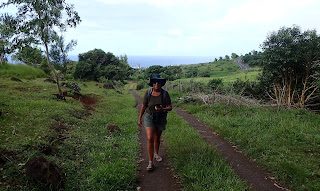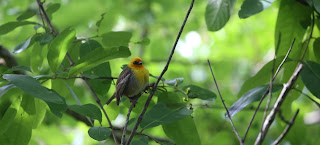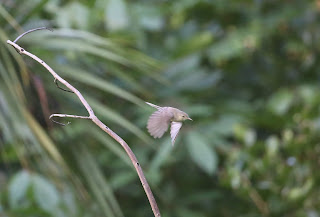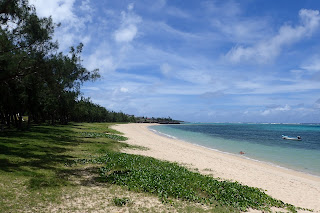We flew into Rodrigues from Mauritius on 1st March. The taxi was there to meet us, & we drove cross the island to our accommodation. It is easy to see why this island is one of the most ecologically devastated on Earth! We couldn't see any natural vegetation at all, just alien plants & animals.
The northern coast.
After settling in, we went for a short drive along the coast & then a walk along English Bay. Followed by a meal in the Blue Marlin Restaurant, which was very nice. We made plans for the next day to see the two endemic bird species.
Information Centre.
On 2nd March we drove to Grande Montagne Reserve. This is another Mauritian Wildlife Organisation reserve, where they are trying to restore the native flora. Our guide was knowledgeable & enthusiastic & we set off along the trail.
Unfortunately the heavens opened & the tour was cancelled due to the torrential rain. We did see a Rodriques Warbler though, but the light was very bad for photos. The information centre was informative & well done, but it was shocking to discover just how many species had become extinct on this island in the last 250 years!
Even inside the reserve, native forest is mixed in
with alien species.
This is a very tough job.
They are busy clearing alien vegetation
& planting native species.
This tree has adapted to predation
by Giant Tortoises. The leaves at the bottom
are spiky & unpalatable. The nice leaves are
higher out of reach!
by Giant Tortoises. The leaves at the bottom
are spiky & unpalatable. The nice leaves are
higher out of reach!
Aldabra Giant Tortoise
Brought in to help tree seed dispersal
& the staff said it is working.
& the staff said it is working.
Unfortunately the heavens opened & the tour was cancelled due to the torrential rain. We did see a Rodriques Warbler though, but the light was very bad for photos. The information centre was informative & well done, but it was shocking to discover just how many species had become extinct on this island in the last 250 years!
We found a nice place to have lunch.
We then did a bit of shopping & managed to spot a Rodrigues Fody in a patch of native forest along the roadside. Yet again no photos.
The track to Solitude Research Station
Singing & displaying.
What a great little bird!
The rather drabber female.
After lunch we decided to visit the Solitude Research Station, which is the established location for seeing the two endemics. The weather looked a little better & we set off along the trail. It proved to be a nice walk & in the first patch of native forest we saw a Rodrigues Fody! It was a male & it started to display. We spent some time with the bird & a female showed up.
Getting into the swing of it!
Madagascan Fody
The warbler habitat.
This species was introduced here & is everywhere. It is a generalist feeder, so feeds on seeds on grasses etc. The Rodriques Fody is a gleaner only found in native forest & is a specialist feeder. The introduced species is obviously a threat to the native one.
Rodrigues Warbler
This species is more delicate in structure
than the Field Guides show.
I suppose not that many people have seen them!
than the Field Guides show.
I suppose not that many people have seen them!
The bill is long, thin & slightly decurved.
It is a strong singer.
A weak flight, a bit like a Prinia.
We saw four more Rodrigues Fodies close to the research station & glimpsed a Rodrigues Warbler. However it didn't co-operate & we walked further hearing several warblers but not seeing them clearly. It was on our way back when we dropped in on a pair showing quite nicely.
Rodrigues Fruit Bat
On our walk back to the car we saw a Rodrigues Fruit Bat overhead. Yet another endemic.
Picasso Triggerfish
Photo courtesy of Delana Louw
Striped Eelfish
Photo courtesy of Delana Louw
Purple Sea Urchin
Photo courtesy of Delana Louw
Photo courtesy of Delana Louw
The next day we woke up to high wins & lashing rain! The morning was a right off & we didn't leave the apartment until the afternoon when the weather had changed a little for the better. Spent the afternoon on the beach, while Delana snorkeled.
In the evening went out for our last meal on the island & then it was time to pack. We flew out the next morning to Mauritius & then on to Johannesburg. It had been an excellent birding trip, exceeding my expectations. However the lack of avian diversity coupled with all the introduced species leaves one a little unsatistfied.
Francis Bay
A nice, laid back spot on the map.
Picasso Triggerfish
Photo courtesy of Delana Louw
Striped Eelfish
Photo courtesy of Delana Louw
Purple Sea Urchin
Photo courtesy of Delana Louw
Photo courtesy of Delana Louw
The next day we woke up to high wins & lashing rain! The morning was a right off & we didn't leave the apartment until the afternoon when the weather had changed a little for the better. Spent the afternoon on the beach, while Delana snorkeled.
Delana has a new hat!
It has been a very good & easy trip.
In the evening went out for our last meal on the island & then it was time to pack. We flew out the next morning to Mauritius & then on to Johannesburg. It had been an excellent birding trip, exceeding my expectations. However the lack of avian diversity coupled with all the introduced species leaves one a little unsatistfied.


























































No comments:
Post a Comment